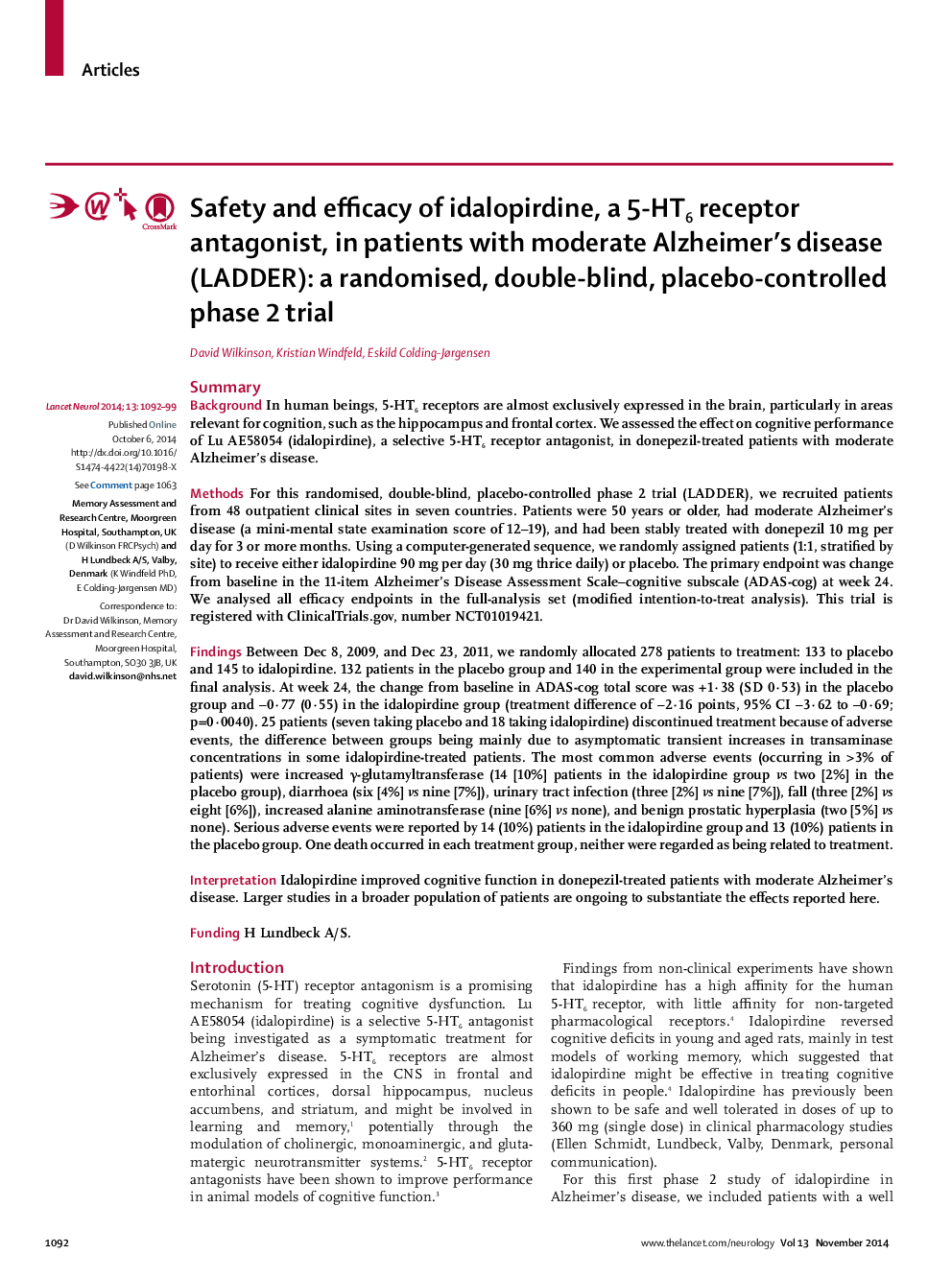| کد مقاله | کد نشریه | سال انتشار | مقاله انگلیسی | نسخه تمام متن |
|---|---|---|---|---|
| 3066539 | 1188082 | 2014 | 8 صفحه PDF | دانلود رایگان |

SummaryBackgroundIn human beings, 5-HT6 receptors are almost exclusively expressed in the brain, particularly in areas relevant for cognition, such as the hippocampus and frontal cortex. We assessed the effect on cognitive performance of Lu AE58054 (idalopirdine), a selective 5-HT6 receptor antagonist, in donepezil-treated patients with moderate Alzheimer's disease.MethodsFor this randomised, double-blind, placebo-controlled phase 2 trial (LADDER), we recruited patients from 48 outpatient clinical sites in seven countries. Patients were 50 years or older, had moderate Alzheimer's disease (a mini-mental state examination score of 12–19), and had been stably treated with donepezil 10 mg per day for 3 or more months. Using a computer-generated sequence, we randomly assigned patients (1:1, stratified by site) to receive either idalopirdine 90 mg per day (30 mg thrice daily) or placebo. The primary endpoint was change from baseline in the 11-item Alzheimer's Disease Assessment Scale–cognitive subscale (ADAS-cog) at week 24. We analysed all efficacy endpoints in the full-analysis set (modified intention-to-treat analysis). This trial is registered with ClinicalTrials.gov, number NCT01019421.FindingsBetween Dec 8, 2009, and Dec 23, 2011, we randomly allocated 278 patients to treatment: 133 to placebo and 145 to idalopirdine. 132 patients in the placebo group and 140 in the experimental group were included in the final analysis. At week 24, the change from baseline in ADAS-cog total score was +1·38 (SD 0·53) in the placebo group and −0·77 (0·55) in the idalopirdine group (treatment difference of −2·16 points, 95% CI −3·62 to −0·69; p=0·0040). 25 patients (seven taking placebo and 18 taking idalopirdine) discontinued treatment because of adverse events, the difference between groups being mainly due to asymptomatic transient increases in transaminase concentrations in some idalopirdine-treated patients. The most common adverse events (occurring in >3% of patients) were increased γ-glutamyltransferase (14 [10%] patients in the idalopirdine group vs two [2%] in the placebo group), diarrhoea (six [4%] vs nine [7%]), urinary tract infection (three [2%] vs nine [7%]), fall (three [2%] vs eight [6%]), increased alanine aminotransferase (nine [6%] vs none), and benign prostatic hyperplasia (two [5%] vs none). Serious adverse events were reported by 14 (10%) patients in the idalopirdine group and 13 (10%) patients in the placebo group. One death occurred in each treatment group, neither were regarded as being related to treatment.InterpretationIdalopirdine improved cognitive function in donepezil-treated patients with moderate Alzheimer's disease. Larger studies in a broader population of patients are ongoing to substantiate the effects reported here.FundingH Lundbeck A/S.
Journal: - Volume 13, Issue 11, November 2014, Pages 1092–1099